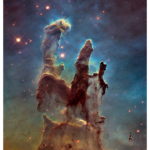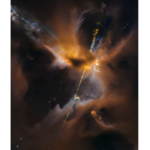
Photo: Hubblesite.org
One year, after discussing “The Big Bang Theory†in the Biodesign Class, unbeknown to me, a quiet, thoughtful Latina girl went to church the following Sunday. After the service, she approached her priest and asked, “Father, if God made the universe, who made God?†The priest’s face turned red, he stooped down and whispered sharply in her ear, “We don’t ask questions like that,†turned on his heel and stomped off.
“Why did he get angry with me?†she asked.
Not unlike the local priest, there is a story that the Pope once asked Stephen Hawking not to try to inquire about what happened before the Big Bang, and Hawking agreed. Perhaps, not because he wanted to comply with the pope’s wishes, but because it is fundamentally impossible to find out something that happened before the literal beginning of time. It is as if we walked into a movie theater that had a movie running for 14 billion years and tried to understand how it began.
In 397 A-D, Augustine of Hippo wrote, Confessions: Thirteen books, which, according to some scholars, is the greatest collection of books other than the Holy Bible. It had a profound impact on the evolution of Christianity and Western Civilization.
He may have formulated the first known version of the “Big Bang†theory by pointing out, “there was no ‘then’ when there was no time†and “when God created the Heavens and the Earth, he created time itself as well.â€
There may be no scientific proof for the existence of God, but 1600 years later, scientists have not been able to refute his theory. In fact, excepting the cause, it aligns well with the currently accepted “Big Bang†theory.
In his early studies, Einstein favored The Steady-state Theory which my students thought was lame because it failed to address the beginning of the universe. Later he arrived at his General Theory of Relativity, one of the rules of which states that time is fundamentally bound to matter and gravity, and that without matter there would be no time. Although the approach was different, the general idea was proposed by Augustine 1550 years earlier.

Photo: Hubblesite.org
Yet antithetically, it was Augustine’s reconcilliation of the methods of the principles of Grecian philosophy and reason to the Christian concept of God that forced him to arrive at his conclusion. Democritus introduced the concept of, “atoma†(indivisible) to explain all matter without explaining a beginning. Plato and Aristotle both regarded time as being infinite, moving forward, without a beginning or end.

Photo: Hubblesite.org
In 1929 Einstein was no doubt influenced by a major breakthrough when Edwin Hubble discovered “The Red Shift Theory†which led to the “Big Bang Theory.†At first, he was skeptical and quipped, “I find the idea of a Universe with a beginning irritating.â€
When students asked me what I thought about the “Big Bang Theory,†I answered by suggesting that it just might be the quintessential synchronicity. It is an unparalleled event that has no known cause. Currently scientists tend to agree that the Universe came from a bit of “super-matter†about the size of a grain of sand. Ergo, Maria (and others) asked who/what made the grain of sand?
A group of scientists at CERN, the European Organization for Nuclear Research have spent billions of dollars searching for the “God Particle,†but have not succeeded. It is possible that they will never succeed.
According to 13th century mystic/scientist/philosopher, Meister Eckhart, the answers to the great mysteries of the universe will not be solved by science.
My best explanation to students was that the “Big Bang†seems to be an event caused by a being, power or process that defies human understanding. I would playfully add that perhaps we should be concerned about a “GIB GNAB†event, the reverse of the Big Bang whereby “everything†in the universe returns to a grain of sand. Of course, if everything disappeared nothing would matter. LOL

Photo: Hubblesite.org
It was exciting that Maria was in good company with the great Albert Einstein with her probing questions:
“The scientists’ religious feeling takes the form of a rapturous amazement at the harmony of natural law, which reveals an intelligence of such superiority that, compared with it, all the systematic thinking and acting of human beings is an utterly insignificant reflection.â€
Theories, like people often evolve and Einstein’s spiritual awareness evolved to his conclusion:
“I want to know how God created this world. I am not interested in this or that phenomenon, in the spectrum of this or that element. I want to know His thoughts; the rest are details.â€

Photo: www.nasa.org
Favorite Einstein quotes:
https://www.simpletoremember.com/articles/a/einstein/